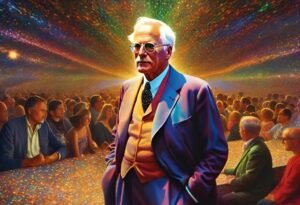Renowned Swiss psychiatrist Carl Gustav Jung introduced some of the most influential concepts in psychology, fundamentally altering our understanding of the human psyche. Central to his ideas are the concepts of the Shadow, the Persona, and the Ego. By unravelling these aspects of our psyche and developing an awareness of their influence, we can navigate our lives with a deeper sense of understanding and purpose.
The Ego: Our Conscious Identity
The Ego, according to Jungian psychology, forms the centre of our conscious identity. It’s our self-awareness, the sense of ‘I’ that interacts with and perceives the world around us. It’s our subjective reality, the decision-maker, the part of us that thinks, reflects, and ultimately, acts upon the world.
When the Ego is imbalanced or inflated, it can distort our perspective of reality. For example, an inflated Ego may cause someone to view themselves as superior, leading to a sense of entitlement and lack of empathy towards others. Conversely, a diminished Ego might make a person feel constantly inadequate and powerless, leading to self-defeating behaviours and a sense of perpetual victimhood.
A healthy Ego, however, provides a balanced self-perception. It allows for self-confidence without arrogance, humility without self-deprecation. It helps us interact with the world realistically and productively, acknowledging both our strengths and our areas for improvement.
The Persona: The Mask We Wear
The Persona, in Jung’s theory, is our social mask—the face we show the world. It’s the role we play in different situations, shaped by societal norms, expectations, and social conditioning. It embodies how we want others to perceive us and how we present ourselves in different contexts.
An over-reliance on the Persona can lead to a distortion of our true self. For instance, a person may become so absorbed in maintaining a perfect image that they disconnect from their authentic feelings and desires, leading to a sense of emptiness or fraudulence, often referred to as ‘Imposter Syndrome’.
On the contrary, a well-integrated Persona supports healthy social interactions. It allows us to behave appropriately in different contexts while staying connected to our authentic self. It facilitates genuine connections and helps us present ourselves honestly and appropriately.
The Shadow: The Hidden Self
The Shadow represents the unconscious aspects of our personality—those parts of us that our Ego does not identify with or has repressed. These could include unwelcome emotions, desires, and traits. Essentially, it’s our hidden self, the parts of us that we’d rather not acknowledge—our ‘dark’ side.
When the Shadow remains wholly unconscious, it can distort our behaviours in unanticipated ways. For instance, someone might project their repressed anger onto others, interpreting neutral or mildly irritating situations as highly offensive. This unconscious influence can lead to a pattern of overly reactive and aggressive behaviour.
Acknowledging and integrating the Shadow, however, is a key step towards self-acceptance and psychological growth. It allows us to understand and transform our negative patterns, promoting a healthier and more holistic self-image. It paves the way for self-discovery and fosters a deeper, more compassionate understanding of our complex nature.
The Interplay of the Shadow, Persona, and Ego
These three aspects of our psyche don’t exist in isolation but interact dynamically within us. The Persona mediates between the Ego (our conscious self) and the social world, determining how we behave in different situations. The Shadow, while largely unconscious, influences our thoughts, emotions, and actions in ways we may not realize.
Our Shadow can sometimes break through the Persona, causing actions that seem out of character. Conversely, an overidentified Persona might suppress the Ego, leading us to lose touch with our authentic self. A mature Ego can help mediate between the Persona and the Shadow, leading to greater self-awareness and psychological balance.
The Benefits of Awareness
Understanding these Jungian concepts can significantly benefit our self-awareness and personal growth. Here’s how:
- Understanding the Persona: By identifying the masks we wear, we can become more authentic in our relationships and interactions. We can start to differentiate between the roles we play and our true self.
- Integrating the Shadow: Acknowledging and integrating our Shadow leads to self-acceptance and wholeness. It helps us confront and transform negative patterns and unconscious biases.
- Strengthening the Ego: By reinforcing our Ego, we develop resilience, autonomy, and a healthier sense of self. It can mediate effectively between the demands of the Persona and the Shadow.
Breaking My Addictions Summary and Conclusion
Jung’s concepts of the Shadow, Persona, and Ego provide valuable tools for self-understanding and growth. By acknowledging the roles we play (Persona), exploring the hidden parts of ourselves (Shadow), and reinforcing our conscious identity (Ego), we can achieve a healthier psychological balance.
This journey into self-awareness empowers us to live more authentically, understand our behavioural patterns, and harness our full potential. As we navigate this intricate interplay within our psyche, we’re not only improving our understanding of ourselves but also cultivating deeper relationships with others and the world around us. Thus, we gradually become the architects of our own growth and transformation.













